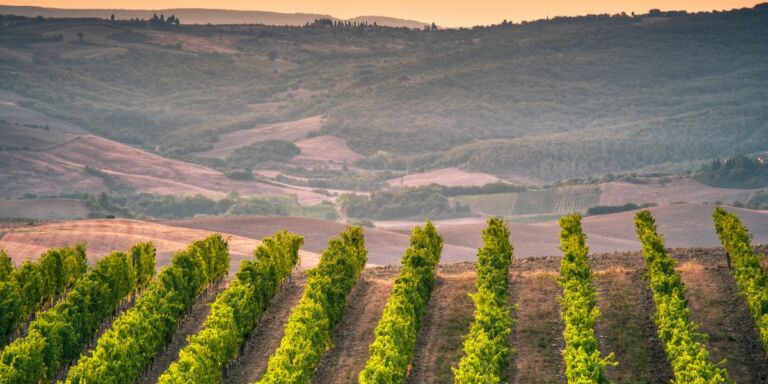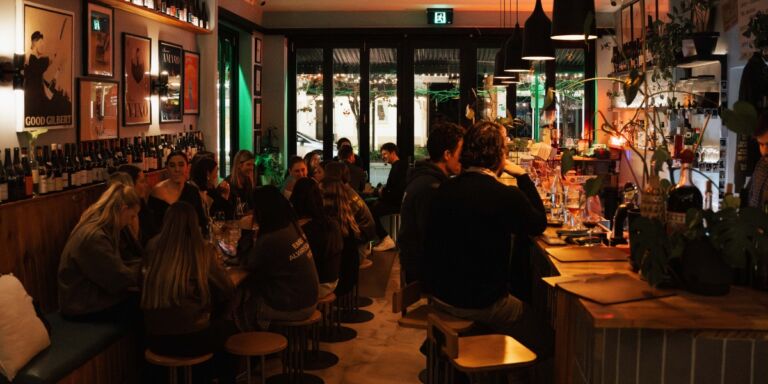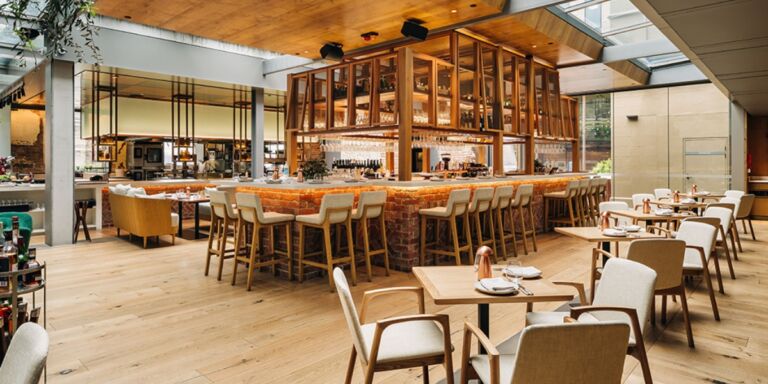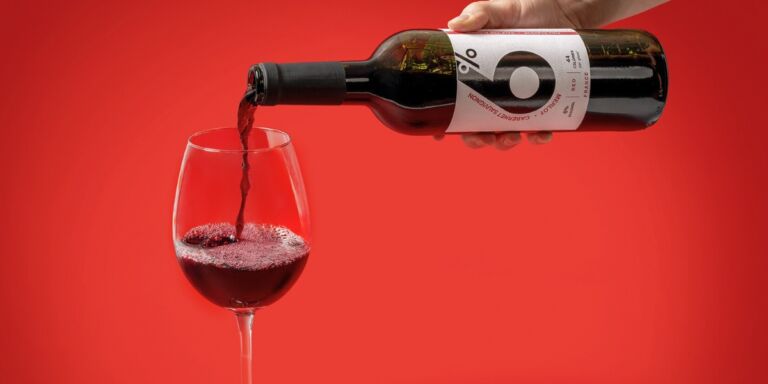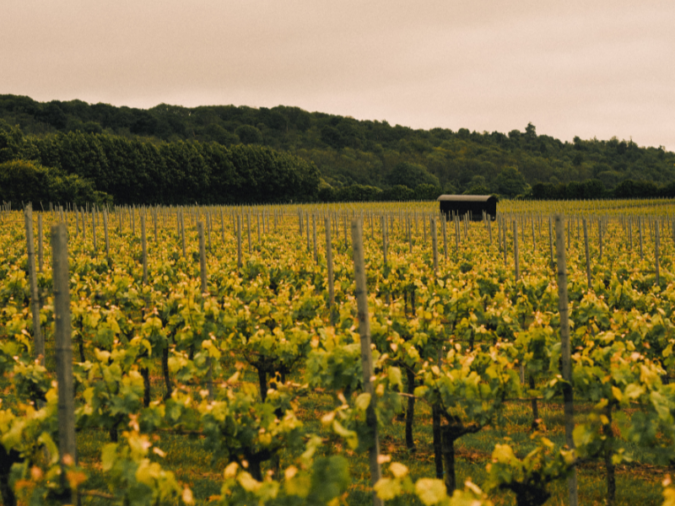In the early 1990s, fresh out of university in Paris (where she had studied the chemistry of soils) Corinne Seely applied to the Institute of Vine and Wine Sciences at Bordeaux University. She was rejected, she tells me, on the basis that she had no family connections to wine, and moreover she was a woman. Luckily, one of her best friends happened to be the niece of Jean-Michel Cazes of Château Lynch-Bages, who offered her an internship.
‘I was involved in making the first vintage of Lynch-Bages Blanc. It was such an adventure. I went back to the principal of the Institute and said, “Look, I’m working in Bordeaux and I’m still a woman.”’ She duly completed her oenology degree.
The episode might encapsulate the personality of Seely, who has been wine director at Exton Park in Hampshire since 2009. There’s a certain maverick streak (the study of soils wasn’t a recognised route into wine in the ’90s); there’s a willingness to grasp an opportunity, as well as an unwillingness to be patronised by the Bordeaux establishment.

Seely (she used to be married to AXA Millésimes’ CEO, Christian Seely, and made the early vintages of his highly-regarded Coates & Seely English sparkling. They remain good friends, she says) came to Exton Park after a stint as one of the youngest head winemakers at Domaine de Chevalier in the Graves, and consultancies in Australia, the Douro and the Languedoc. She’s now one of the very few French winemakers working in England.
On her watch, Exton Park has become one of the most lauded of the major English producers. Seely and vineyard director Fred Langdale have subdivided the single 60 acre (24ha) vineyard into nine parcels of Chardonnay, Pinot Noir and Pinot Meunier, which are vinified in a variety of small stainless steel tanks. The blends are made exclusively from reserve wines built up over 10 years – there’s no vintage wine, apart from their 10th anniversary Cuvée Malcolm Isaac 2011, named after Exton Park’s founder, the pioneering watercress farmer who bought the estate in 2009 and whom Seely considers ‘a visionary’.
There is a pioneering spirit to Exton Park, not least in the unveiling of Exton Hall, a modern cathedral of a tasting centre at the top of the vineyard. It’s a designer base for the members’ club, the Vault, which would seem to have more in common with the Napa Valley than down-to-earth Hampshire.

But Seely’s far more at home in her tank room than she is with the high-rollers. She regards England as a winemaker’s dream. She marvels at the terroir: the salinity that the maritime climate imparts to the wines – ‘It’s remarkable, it’s like the smell in the air when you walk on the beach’ – and the piercing acidity. ‘Someone described it recently as “cracking acidity”, which is true,’ she says. ‘It’s brighter and fresher than Champagne. English wine is more precise.’ In fact, she has little time for comparisons with Champagne. The regions have many more differences than similarities, she says, ‘In terms of budburst, flowering, harvest, rainfall, sunshine…’ and the ever-present acidity ‘which lifts the flavours’.
England means innovation, freedom and the future, and the industry is blossoming. I’m very glad to be a part of it
Part of the appeal of England for Seely is that it’s a tabula rasa for a winemaker. She says they are very lucky in having an owner such as Isaac. He has patience, she says, and that’s the key to English wine: the acidity needs time to balance out. ‘The more you age the Chardonnay, you can build those brioche flavours but you still have a level of acidity that is integrated and balanced, and keeps the wine fresh.’

Seely is a winemaker at the peak of her career but she remains endlessly curious (she recently unveiled a batch of wine she had aged 60m below sea level). ‘We’re still learning,’ she says. Above all, she’s a professional, and she has a stern warning for what she calls ‘hobbyists’: ‘There are people who aim at making top quality, against people who think “Let’s plant vines and play with it”. Making wine is very serious, it needs precision and much more skill than you think.’
What about the future – would she take a job in Champagne if one of the Grand Marques came calling? There isn’t even a pause. ‘The answer would be no. It’s like jail, making wine in France. England means innovation, freedom and the future, and the industry is blossoming. I’m very glad to be a part of it.’

What was your childhood ambition?
I was a dreamer. I read a lot. I wanted adventures. I was thinking of becoming a spy or an astronaut. I started tasting with my grandfather at about the age of 15 – he wasn’t involved in wine but he loved a glass, especially for Sunday lunch. He was always fond of Sauternes so I discovered Yquem as a teenager, and Haut-Brion, and Burgundy.
What do you know now that you wish you’d known when you were 21?
‘Tout le Bonheur est dans l’Inattendu’ (‘All the happiness in the world is in the unexpected’) – Jean d’Ormesson – whose writing I recommend.
To realise that you create opportunities every day of your life, that you are not alone and that people can actually bring good changes to your life when you don’t expect them. In short, be less individualistic and trust life to teach you.
What exercise do you do?
I still read a lot. And I like playing tennis.
What is the character trait you most wish you could change in yourself?
To be perhaps less invested in what I do. It can become extreme.
What is the most expensive thing you’ve ever bought, apart from property?
A bottle of Château Margaux 1964 for a friend when I was a student… I don’t regret it. We opened it together!
If you could live anywhere, where would it be and why?
I really like Portugal. The people and the climate are great, as well as the food and wine.

If you could do any other job, what would it be and why?
I believe that I have one of the greatest jobs in the world. Why would I change?
What luxury item would you take with you to a desert island?
A big mirror to be used to reflect the sun to make people aware that I am there. I am not tempted to go to a desert island, though.
What haven’t you yet achieved that you would like to?
Now that Exton Park is, I believe, recognised as one of the best English sparkling wines, I would like to see Exton Park becoming one of the best global ambassadors for English wine.
If you were king or queen of the world, what’s the first law you would enact?
To make sure that every single child in the world can receive an education and go to school.
Who would you invite to your fantasy dinner party – and why?
My winemaker friends from around the world because we always have a lot of fun together – and they will bring great wines.
What’s your guilty pleasure?
To have a nice glass of wine while someone is cooking for me. I can do the opposite too, with infinite pleasure.

What’s your secret talent?
To create opportunities before they become obvious.
When are you happiest?
When I am with my friends and family.
Whom do you most admire?
Those who have the courage to push the boundaries.
Which words or phrases do you most overuse?
‘What is done is no longer to do’ and ‘There is always a solution… even if it is a difficult one.’
What’s your greatest regret?
No longer having the opportunity to spend time with people who have left us.
What album, boxset or podcast would you listen to on a night in alone on the sofa?
All of Supertramp’s albums.
What’s your favourite item in your wardrobe?
My ties. I have a vintage one from my grandmother that I am particularly fond of.
What’s your favourite restaurant?
There’s a different one in each city. I particularly miss Fakhreldine, the Lebanese restaurant in Mayfair [which is now closed, the premises, at 85 Piccadilly, taken over by Hide]
What time do you go to bed?
Certainly too late, but we have only one life, don’t we?

